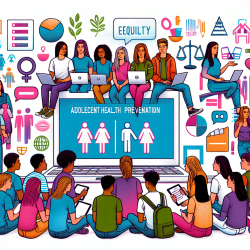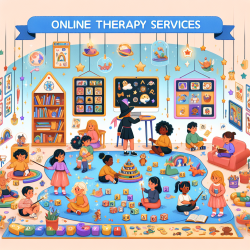Introduction
Transgender and gender-diverse (TGD) youth face unique mental health challenges that require specialized attention from practitioners. The research article "Differential Experiences of Mental Health among Transgender and Gender-Diverse Youth in Colorado" provides critical insights into these challenges, highlighting the importance of tailored interventions. This blog aims to help practitioners improve their skills by implementing the outcomes of this research or by encouraging them to engage in further studies.
Key Findings from the Research
The study, conducted with over 400 TGD youth in Colorado, identified several key mental health concerns:
- Depression: TGD youth who do not identify within the masculine/feminine binary and those with marginalized sexual orientations are two to three times more likely to experience depression.
- Non-Suicidal Self-Injury (NSSI): The likelihood of engaging in NSSI is significantly higher among TGD youth, particularly those who are bisexual or questioning their sexual orientation.
- Suicidal Ideation and Attempts: TGD youth are at a higher risk for suicidal ideation and attempts, with those identifying outside the gender binary being particularly vulnerable.
Implications for Practitioners
Practitioners working with TGD youth should consider the following strategies to improve mental health outcomes:
- Individualized Care: Recognize that mental health is not a one-size-fits-all model for TGD youth. Tailor interventions to address the specific needs of each individual, considering their unique gender identity and sexual orientation.
- Intersectional Approach: Understand that the intersection of multiple marginalized identities (e.g., race, sexual orientation) can exacerbate mental health issues. Incorporate this understanding into your practice to provide more holistic care.
- Affirming Environment: Create a supportive and affirming environment for TGD youth. This includes using correct pronouns, respecting their gender identity, and providing a safe space for them to express themselves.
- Community Support: Encourage the involvement of supportive community networks, including family, friends, and TGD-specific support groups. Community support can play a crucial role in improving mental health outcomes.
- Policy Advocacy: Advocate for policies that protect TGD youth from discrimination and violence. Support initiatives that promote inclusivity and equality at the local, state, and federal levels.
Encouraging Further Research
While the findings of this study are significant, there is a need for further research to explore the nuances of mental health among TGD youth. Practitioners are encouraged to engage in or support research that examines:
- The specific triggers of mental health concerns in TGD youth, such as experiences of discrimination and societal stigma.
- The effectiveness of different interventions and support mechanisms tailored to TGD youth.
- The impact of community and family support on the mental health of TGD youth.
Conclusion
Improving mental health outcomes for TGD youth requires a multifaceted approach that considers the unique challenges they face. By implementing the findings of this research and engaging in further studies, practitioners can make a significant difference in the lives of TGD youth. To read the original research paper, please follow this link: Differential Experiences of Mental Health among Transgender and Gender-Diverse Youth in Colorado.










